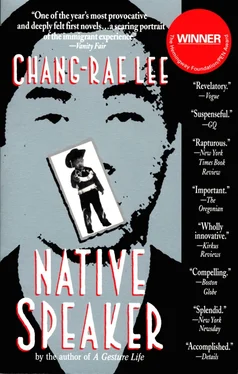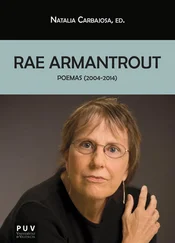“So we will.”
Pete offers me a toothpick. “You know, Harry, Dennis wants you to know he thinks you’re doing a beautiful job this time.”
“Fuck you, too, Pete.”
Grace says, “I heard him myself, Harry.”
“Of course you did,” I say. I push my bowl to the side. The woman comes around to take my plates and refill our water glasses but Pete waves her off. Catching my eye, she looks a little scared for me. I say “ gaen-cha-nah,” it’s all right , but she doesn’t seem to hear me, as if not understanding, and she goes.
Pete stares at me and says in the most even voice: “You brought what you were supposed to?”
I nod.
Grace quietly finishes her soup. We are friends again, after a fashion. She and Pete will enjoy my company, and I will enjoy theirs. We are friends in the way people in an unprovisioned lifeboat are, chance consorts who are sure that they’ll be picked up soon, any day now, but not exactly how or when.
Pete pays the check and leaves a big tip. The waitress smiles at him. He and Grace climb into his German coupe, my manila envelope safely in the back. They will drive across the Whitestone Bridge to his condo in Stamford. Before they go Pete describes the islands where they’ve been, the snorkeling he did under the glassy water, showing with his hands how his body knifed through the pools of coral inlets, Grace looking on from the shore.
They pull away. Grace waves. She is too young, even for us. She must be only twenty-five, and I remember Dennis bragging about how he recruited her outside a downtown temp agency with the promise of working in a multinational business. He had his choice of a dozen Ivy Leaguers, but he wanted her, he said, for her “Iron Curtain look,” the angular temples and jaw, the heady alto speaking voice. She was obviously smart and trainable.
And as I flag a taxi to go back home, I wonder what any of our parents would think, if they knew the whole truth. And would they even disapprove? If anything, I think my father would choose to see my deceptions in a rigidly practical light, as if they were similar to that daily survival he came to endure, the need to adapt, assume an advantageous shape.
My ugly immigrant’s truth, as was his, is that I have exploited my own, and those others who can be exploited. This forever is my burden to bear. But I and my kind possess another dimension. We will learn every lesson of accent and idiom, we will dismantle every last pretense and practice you hold, noble as well as ruinous. You can keep nothing safe from our eyes and ears. This is your own history. We are your most perilous and dutiful brethren, the song of our hearts at once furious and sad. For only you could grant me these lyrical modes. I call them back to you. Here is the sole talent I ever dared nurture. Here is all of my American education.
They have flash pictures of him leaving a downtown precinct house after his bail is posted. It’s all in time for the morning edition. They have him in the bricked alley behind the building, the shots dark and grainy. They have him walking away in half-profile, from the back, from the side, his suit jacket unfurled, suggesting flight. No one is with him. His tie is unknotted and his hair is dampened and mussed and he has a gauze patch taped above his left temple where his head glanced the ceiling of his sedan when it crashed. His body must have popped up when he hit the concrete divider of the bridge on-ramp, his suit shoulder become caught and torn on some window trim. The white batting is fluffed out, exposed, the whole effect of him vapid and dislodged. His left eye is black, closed almost to a squint by the swelling. The right one, mulish, untouched, stares back dead at the lens.
The shots are nearly criminal.
The accompanying text reads as if it is compiled rather than written. There seem to be several points of view embedded within the article, though each of them is indignant and righteous in tone. The words merely serve the pictures of the subject in question, employing the facts for the tabloid polemic of how a city should be run, justice served.
Evidently, he had an airbag. The girl didn’t. They don’t yet have pictures of her. Maybe tomorrow. She still lies in the ICU at Beth Israel Hospital with the tube of an air pump taped inside her mouth to make her lungs work. She is still in a coma. Her skull hit the windshield and jerked her neck to the side with a freak snap. They say her face is hardly even scratched, just a small bruise on the side of her cheek, one mark on the pretty sleeper. Councilman Kwang tells the officers on the scene — who arrive at the accident immediately and then in swarms — that he wasn’t even traveling very fast, maybe thirty-five miles per hour. The police verify this by the crumple pattern and damage to the divider and where the car comes to rest. There are no skid marks. They also verify his blood alcohol level, which is still above the legal limit two hours after the crash.
The police don’t know the identity of the girl right away because no one can read the ID card in her purse; they send a copy of it to a language department at Columbia. Her name comes back as Chun Ji-yun. It’s difficult for the police because no one where she works wants to talk, and everyone’s English is poor. They know she is sixteen years old, born in Seoul. She shares an apartment with some other girls who work at the bar. The police believe that she is a “hospitality girl,” which the newspaper says is a type of Asian prostitute. They quote the police quoting the councilman as admitting to meeting her at the midtown club, drinking a little, agreeing to drive her home. He tells the police the two of them were alone the whole time.
Janice is going crazy. We are at her apartment in Astoria because no one is at his house, where both of us headed when we learned the news. She’s cursing now, wringing her hands, stomping her feet. This is it, she keeps saying, this is it. It’s over now, it’s fucking over. We’re done.
I was thinking the same when I rushed over to Woodside in the morning. We were done. The whole thing, literally out of my hands. And yet, on seeing his face, his spelled-out name, I immediately began to get ready to go. Lelia had already left the apartment for a freelance job, though she’d clipped a note to the front page of the paper: You don’t have to go . We both knew that with the list in Hoagland’s care I had been finally taken off, that there was no official prerogative anymore, no high man or custom to heed. I felt alone, alarmingly so. And washing the sleep from my face, I remembered how for a time in my boyhood I would often awake before dawn and step outside on the front porch. It was always perfectly quiet and dark, as if the land were completely unpeopled save for me. No Korean father or mother, no taunting boys or girls, no teachers showing me how to say my American name. I’d then run back inside and look in the mirror, desperately hoping in that solitary moment to catch a glimpse of who I truly was; but looking back at me was just the same boy again, no clearer than before, unshakably lodged in that difficult face.
No one has seen John since he was released late last night, four or five hours after the crash. The night before that, he and I and Sherrie were at the bar. He must have gone back, or stayed a whole day longer with the girl. But he has disappeared. The print and TV people already seem to know this because they’ve assigned skeleton crews to wait around at the house. Janice calls Sherrie but no one answers. She’s turned off her machine. Janice finally reaches Jenkins, but he tells her he can’t come meet us. He says he needs some time and can’t talk and hangs up.
May and the boys are on their way down from upstate. Janice has already asked her where he might have gone. She doesn’t know. We have to find him to know what we can say and do, if anything. I can see that Janice senses it’s all her ship, but the waterline is rising and she needs to make decisions. The question isn’t damage control. It’s no longer about containment or what we can spin. He can’t hide now, he’s not a victim of some bombing anymore; he’s a player, a principal. We need to find him and just survive.
Читать дальше












